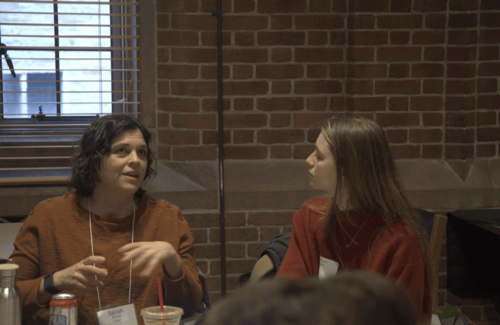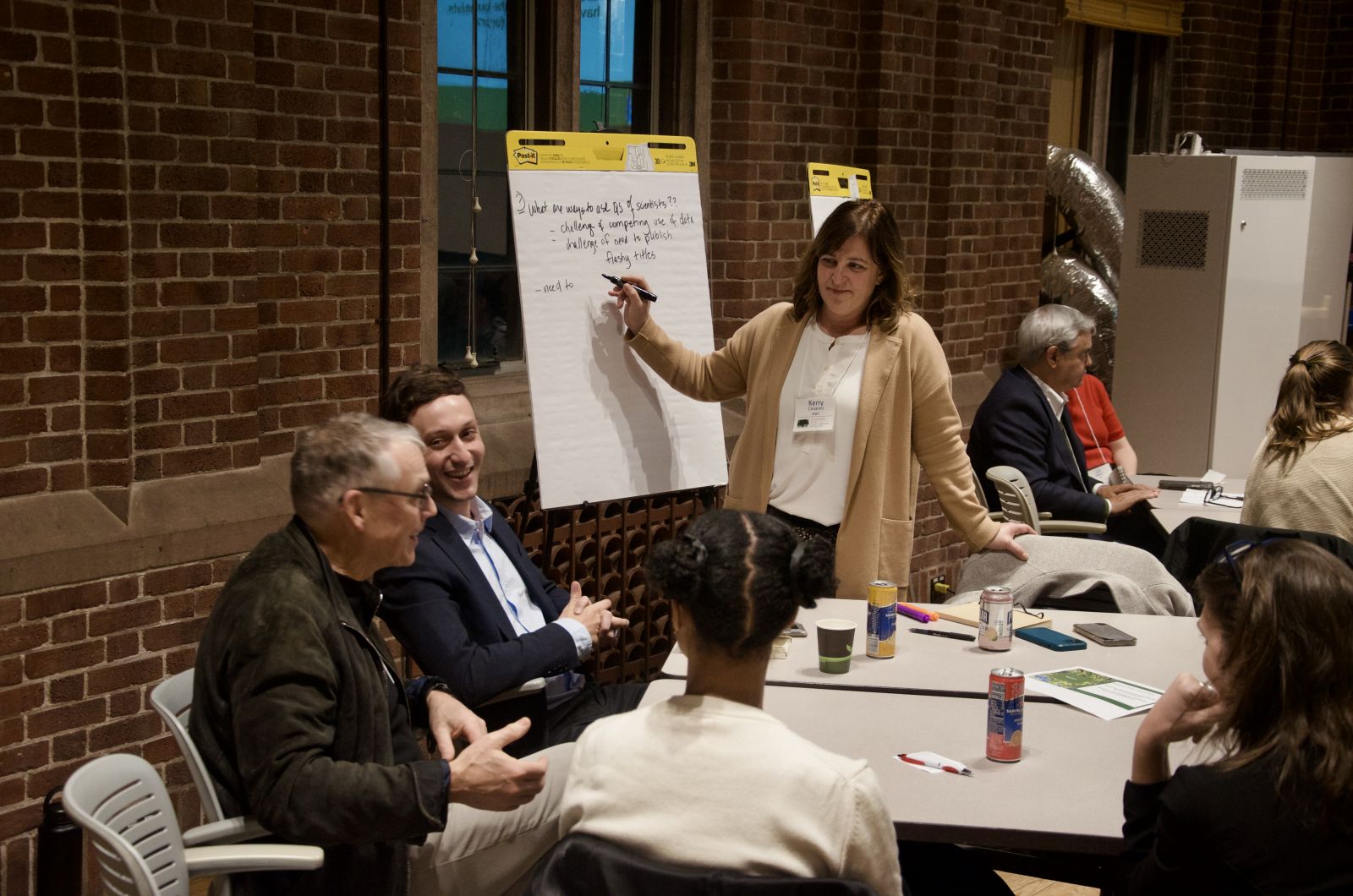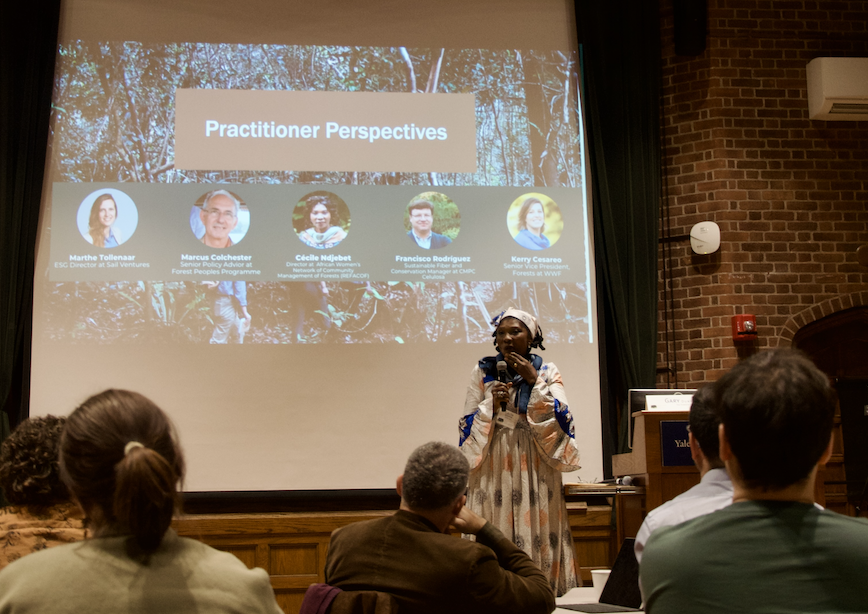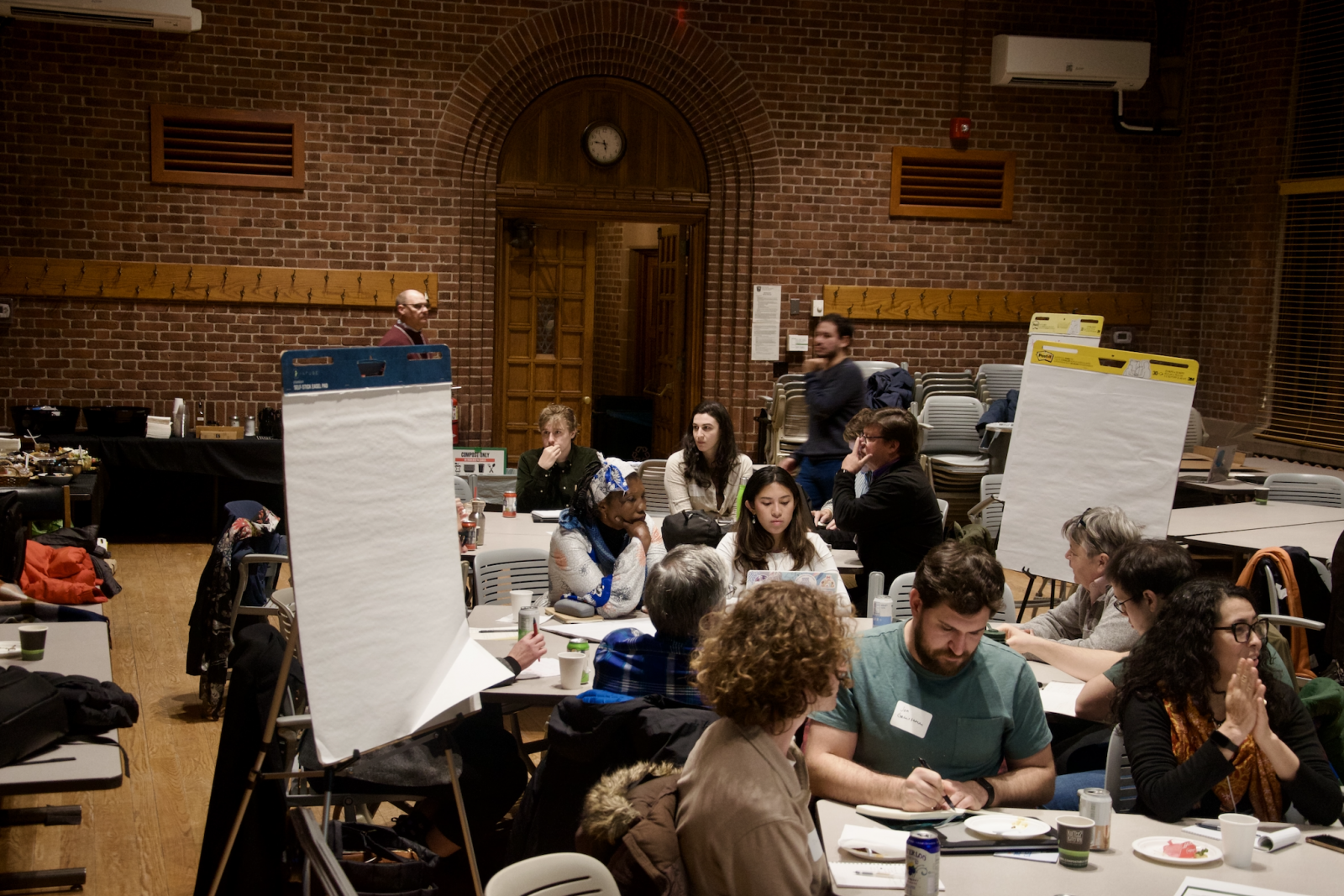
By: Isabela Valencia, Dr. Sara Kuebbing
Thursday, February 1, 2024 at 4-6:30 pm ET | Bowers Hall in Sage
Co-hosted by The Forests Dialogue, the Yale Applied Science Synthesis Program (YASSP), and the Yale Center for Natural Carbon Capture (YCNCC)
Introduction
This report summarizes the Forests in a Changing Climate: Greenhouse Gas Source or Sink? Event that was held on Thursday, February 1, 2024, in New Haven, CT. The event was held as part of TFD Week, a set of events held during The Forests Dialogue’s (TFD) annual Steering Committee meeting. The event was organized in partnership with the Yale Applied Science Synthesis Program (YASSP)[1] and the Yale Center for Natural Carbon Capture (YCNCC). Key topics that the event explored involved the role of forests in carbon dioxide removal, the threats climate change posed on forest carbon stocks and forest health, and strategies to maintain forests’ crucial function in mitigating climate change.

TFD Steering Committee member Kerry Cesareo leading a breakout group.
The discussions yielded the following key takeaways:
- There is a need for continued and increased collaboration between sectors. Participants stressed the need for scientists and practitioners to work together in critically evaluating information and supporting adaptive management and local or community knowledge. A key challenge that remains is conveying and maintaining the nuance of scientific studies to policymakers and forest stakeholders.
- Practitioners require better accessibility to scientific understandings of forests and climate change dynamics. Increased communication channels between scientists and practitioners can help inform decision-making and lead to more successful, holistic solutions. For the forest industry in particular, science is one component that practitioners use to inform their conservation and biodiversity strategies, along with other factors such as profitability and economic feasibility. Summarized, peer-reviewed science that is easier to access is essential for integrating scientific findings into the operational strategies of businesses. So too are workshops convening practitioners, scientists, and project developers to work on information gaps, such as how to enhance forest resilience against climate change impacts.
- Although science is constantly updating and evolving, frameworks to guard against climate change need to be implemented. There needs to be no-regret strategies that mobilize climate adaptation and mitigation actions and adaptive management for local contexts.
Event Description
The event featured presentations by scientists from YCNCC on the dynamics of forest carbon sequestration, the challenges faced by forests, and its global implications. TFD Executive Director Gary [KS1] Dunning opened the session by outlining the agenda and objectives. He discussed the event’s purposes, which involved contributing to understanding, sharing perspectives, and stimulating discussion by convening stakeholders. He also provided an overview of TFD’s background and objectives. Dr. Liza Comita, Co-Director YCNCC, [KS2] followed by introducing the YCNCC, YASSP, and the session speakers.
Presentation Synopsis
Two YCNCC researchers, Dr. Sara Kuebbing and Dr. Paulo Brando, spoke on forest ecology and carbon science. They also discussed the global role of forests and land use change on greenhouse gas cycles, disturbance ecology, and how to maintain forests as a carbon sink.
Dr. Sara Kuebbing, Director of Research, Yale Applied Science Synthesis Program and Research Scientist, Yale Center for Natural Carbon Capture and Yale School of the Environment
Dr. Kuebbing presented on forest carbon cycling, highlighting that forests store significant carbon in various “carbon pools” that include living vegetation, leaf litter, deadwood, and soil. She explained that forests act as carbon sinks when net tree growth exceeds tree death. However, forests become carbon sources when disturbances like fire, drought, windstorms, or pests and pathogens lead to tree death exceeding tree growth. Dr. Kuebbing further elaborated on the factors influencing whether a forest serves as a source or sink, including geographic scope, time period, prior condition, and out-of-forest greenhouse gas effects. In presenting a case study on forest management in southern New England, she emphasized the complexities of carbon dynamics over different time periods. She also highlighted the importance of considering wood products in carbon accounting.
Dr. Paulo Brando, Assistant Professor of Ecosystem Carbon Capture, Scientific Leadership Team, Yale Center for Natural Carbon Capture
Dr. Brando discussed the impact of atmospheric changes on the Amazonian forests. He attributed massive droughts and reduced forest carbon sequestration capacity to increases in greenhouse gas emissions and deforestation. He also highlighted the “non-carbon” role of forests in stabilizing regional climates through control of regional precipitation and temperature conditions, emphasizing that declining Amazonian forest cover could lead to hotter and drier conditions, increased wildfires, and continued forest decline. Finally, Dr. Brando underscored the potential emissions resulting from large-scale droughts and wildfire in the Amazon.
Forest Practitioner Perspectives

Cécile Ndjebet sharing experiential climate change challanges with the Event’s attendees.
Following the science presentation, members from TFD’s Steering Committee provided practitioner perspectives. These speakers were SAIL Ventures ESG Director Marthe Tollenaar, Forest Peoples Programme founder and Senior Policy Director Marcus Colchester, African Women’s Network for Community Management of Forests (REFACOF) President Cécile Ndjebet, CMPC Ceululosa Sustainable Fiber and Conservation Manager Francisco Rodríguez, and Senior Vice President of Forests at WWF Kerry Cesareo. Tollenaar discussed initiatives funding forest protection through access to purpose-built capital and supply chain mapping. Colchester reflected on the implications of forest management on local communities and emissions reduction efforts. Ndjebet emphasized the urgent need to address the concrete challenges faced by communities impacted by climate change. Rodríguez outlined actions taken by his company to reduce emissions and increase carbon stock through reforestation. Cesareo highlighted the importance of viewing forests beyond just carbon sinks and advocated for broader approaches to forest protection.
Breakout Group Discussion Summary

Participants getting to know each other in breakout groups.
Informed by the perspectives from scientists and practitioners, event participants split up into breakout group discussions. The small groups facilitated by TFD Steering Committee members were designed to foster engagement and varied perspectives on what the science means for practice, and vice-versa. They also explored the challenges that forests face, the impact of land use change on emissions, and strategies and technologies for enhancing carbon sequestration.
Some key themes emerged across the groups:
- There needs to be continued and increased collaboration between sectors. Participants stressed the need for scientists and practitioners to work together in critically evaluating information and supporting adaptive management and local or community knowledge.
- There needs to be better accessibility to science for practitioners in the forestry industry. Science is one component that practitioners use to inform their conservation and biodiversity strategies, along with others such as profitability and economic feasibility. Summarized, peer-reviewed science that is easier to access is essential for integrating scientific findings into the operational strategies of businesses. So too are workshops convening practitioners, scientists, and project developers to work on information gaps, such as enhancing forest resilience against climate change impacts. Overall, increased communication channels between scientists and practitioners can help inform decision-making and lead to more successful, holistic solutions.
- Even If science is adjusting and evolving, frameworks to guard against climate change need to be implemented. There needs to be no-regret strategies that quickly mobilize climate adaptation and mitigation actions and adaptive management for local contexts.
- Participants discussed the role and challenges of news media to communicate the science of climate change. Participants highlighted the need to ensure that the nuance of science is maintained. There have been instances of problematic interpretations of scientific papers in journalism that seeks to sensationalize headlines. Some scientists have been portrayed as being impartial on an issue. Publicity such as this can negatively impact the public’s perceptions of neutrality in science. It can also distort public understanding of climate change and contribute to distrust.
- Utilizing forest carbon to finance restoration for small landholders is a promising avenue. Still, the market is immature. There needs to be pioneering strategies to test carbon-funded restoration schemes for potential success.
- Science can serve as a mediator in resolving conflicts by informing both practitioners and civil society about best practices for sustainable forest management. Understanding the impacts of practices such as fires on biodiversity and climate change can lead to more cautious practices.
- Both scientists and practitioners have questions and concerns to share with each other. Scientists inquire about monitoring technologies, biodiversity-carbon relationships, and diversification in plantation projects. Practitioners, meanwhile, seek guidance on the interpretation of scientific papers and navigating sustainability certifications.
Acknowledgements
The authors wish to thank the Yale Applied Science Synthesis Program (YASSP) and the Yale Center for Natural Carbon Capture (YCNCC) for their support in co-hosting the event and The Forest Dialogue Steering Committee members and additional practitioners who participated in the event and shared their experiences, knowledge, and recommendations.
[1] YASSP is an initiative of the Yale Center for Natural Carbon Capture in collaboration with The Forest School at the Yale School of the Environment.
